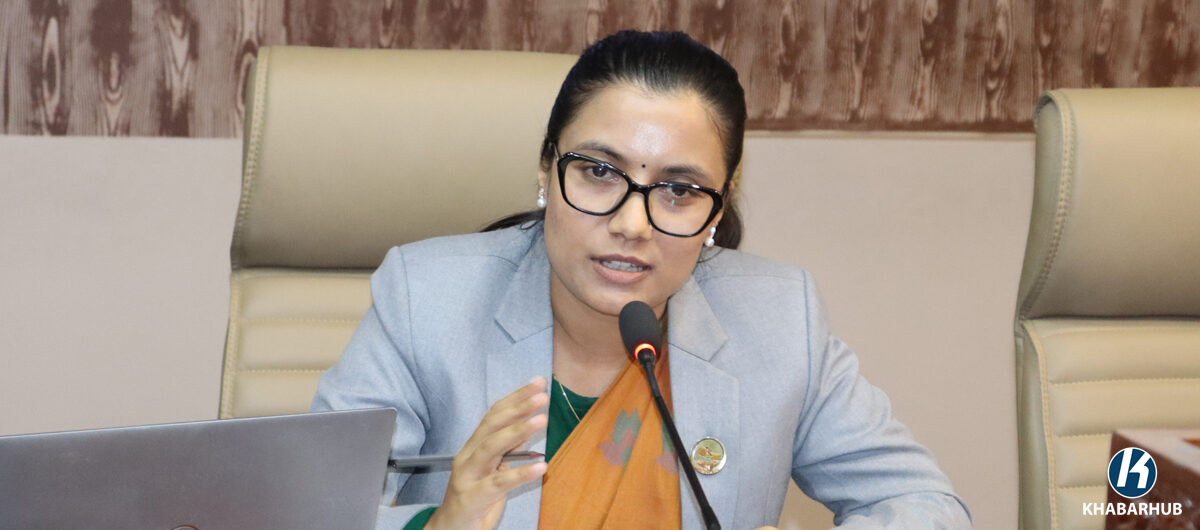KATHMANDU: Rastriya Swatantra Party (RSP) MP Sobita Gautam is one of the few lawmakers in Nepal’s Federal Parliament known for her straightforward presence and active engagement.
A law student by background, Gautam has quickly emerged as a prominent voice in the House of Representatives, frequently speaking up on procedural issues and legislative shortcomings.
In an interview with Khabarhub, she reflected on the recently concluded winter session of parliament, expressing dissatisfaction with its overly controlled nature and the government’s failure to deliver on key legislative needs.
Gautam voiced concern that Parliament was not adequately briefed on significant government initiatives like the upcoming Sagarmatha Dialogue and criticized the lack of transparency and inclusivity in law-making processes.
She called for Home Minister Ramesh Lekhak’s resignation, citing the government’s mishandling of both the Tinkune incident and last September’s flood relief operations.
While Gautam firmly supports reforming the existing system, she emphasized that monarchy cannot be seen as an alternative to the republic. She also believes the “Jana Yatra” (People’s March) campaign, launched by the Rastriya Swatantra Party from Chitwan, will further elevate the party’s national profile.
Khabarhub spoke with MP Gautam, who represents Kathmandu Constituency No. 2, about key political developments and her views on current governance challenges.
Do you think the winter session of Parliament was successful?
This session felt overly control-oriented. We’ve now completed six sessions in Parliament. Initially, we were still learning the environment, but we had expected improvements over time.
Unfortunately, this session was riddled with procedural shortcomings. A major one was during the early days of the session, when the issue of our party president’s suspension was raised.
We demanded the right to speak, but the Speaker moved ahead regardless. We witnessed instances where the Speaker proceeded with House business even while the entire opposition was standing in protest.
It felt as though the proceedings were pre-scripted, like a film with a pre-approved script — only those voices that were ‘verified’ could be heard.
This environment limits the essence of Parliament, which is meant to amplify the people’s voice. The leadership of both major ruling parties is in the government itself, but even then, the Speaker could not remain neutral. The House increasingly feels like a space that filters out genuine concerns.
What, in your view, should the government have done, but failed to do?
There were many areas where the government fell short. Take, for example, the upcoming Sagarmatha Dialogue — a major event — yet no briefing was given to Parliament.
As lawmakers, we should be informed, but instead, it feels like these programs are reserved for the executive only. The House receives no recognition in these matters.
Non-political issues like education, health, and the environment were completely sidelined in favor of political maneuvering. Even direct public concerns weren’t addressed meaningfully. When questioned, the government didn’t take accountability.
A dangerous precedent was set in the law-making process. Normally, bills go through proper scrutiny — amendments are proposed, the relevant committee discusses them, and then a report is submitted for final approval.
But this time, after we submitted our committee report to the full House, the minister introduced new elements and passed them directly — bypassing the committee’s recommendations. When we protested, the two major parties united to suppress the opposition’s voice. This isn’t just bad practice — it’s deeply undemocratic.
Yes, 8–9 laws were passed, which seems acceptable over two years. But the larger concern is the procedural backsliding. Even when ordinances were introduced, proposed amendments to the replacement bills were flatly rejected.
In some cases, we were informed about key discussions only the night before. It all points to a deliberate attempt by the government to assert control over Parliament rather than fostering deliberation.
You mentioned that additional provisions were added to a bill beyond what was discussed in committee. Could you specify which bill and what exactly happened?
This happened in the bill related to statutory provisions. We had thoroughly discussed it in the committee back in the month of Magh. The bill was examined line by line in the presence of the minister, and we reached consensus on the final version.
However, when it reached the full House, the same minister stood at the rostrum and introduced entirely new amendments that were never brought up in the committee.
There was strong opposition to this. It was widely believed that a minister should not unilaterally make such changes after committee deliberations. Surprisingly, the next day, Nepali Congress Whip Sushila Thing supported the minister’s move — but in truth, the process was flawed.
The government did what it wanted, ignoring parliamentary norms. We repeatedly requested the Speaker to intervene and speak on such irregularities, but the matter was handled in a heavily control-oriented way.
Are you also raising concerns about the role of the Speaker in this process?
Yes. The Speaker holds a non-partisan position. Once elected, they are expected to rise above party politics and act impartially. In some instances, however, the Speaker’s role has drawn criticism. After our repeated objections, there was an agreement that such decisions would be discussed collectively moving forward.
Everyone has their human tendencies, but if this pattern continues, questions will inevitably arise about the neutrality of the role. I’m raising this issue now with the hope that necessary corrections will be made.
Is it feasible to hold your party’s general convention in Baisakh as announced?
We’re preparing to hold the general convention as soon as possible. District, municipal, and even some ward-level conventions are already underway. Preparations are progressing steadily, and we expect to see results soon. Wherever possible, we are forming official ward and city committees to establish a regular organizational structure.
The party is currently conducting the ‘Jana Yatra’ campaign. What is the objective behind this initiative?
We had tasked Deputy Parliamentary Party Leader Biraj Bhakta Shrestha with designing the framework for the campaign. He is working on developing a clear model, and once his report is submitted, everything will become more defined.
But at its core, this campaign is about connecting with people across the country. We are confident that this journey will help solidify our party’s place in the hearts of the public.
Was the decision to hold the general convention in Baisakh finalized during the central committee meeting?
Yes, preparations are being made accordingly. The plan is to conduct it in Baisakh, as decided during the national gathering. As of now, there has been no proposal to change the date.
You’ve demanded the resignation of Home Minister Ramesh Lekhak. What’s the primary reason?
The Tinkune protest is the main reason. That movement arose naturally. Yes, there were actions during the protest that were unacceptable, and the government must promptly identify and bring to justice those responsible. This is Kathmandu — a city equipped with surveillance systems, including CCTV footage.
The perpetrators who engaged in arson and violent acts must be held accountable, and victims must be compensated. The government’s failure to do this is alarming.
Even innocent bystanders were shot. I personally met some of them. Initially, only the death caused by burns was reported, while the fatality from gunfire was downplayed.
There was no proper acknowledgment of the civilians who were unjustly shot. The government hasn’t even disclosed the total extent of the damage. Ordinary people — daily wage earners — were injured. The case of the siblings from Bhojpur who were shot remains unresolved.
This shows serious weakness in the government’s response. Nepal’s security agencies couldn’t manage a crowd of just 4,000 people. That’s not just criticism — it’s a failure of governance.
When someone in such a position shows repeated inability to handle crises, they must step down. Minister Lekhak also failed to respond effectively during the flood in Nakkhu.
A person who cannot ensure public safety should not continue in that role — not during natural disasters, and certainly not during public unrest.
What is your party’s stance on the pro-monarchy movement, and how do you interpret the recent political developments surrounding it?
We are clear: we are republicans. We don’t know who exactly is behind the monarchist versus republican debate, but we firmly stand on the side of the republic.
We will not support or participate in any political theatrics, especially those associated with older parties. Monarchy is not — and cannot be — an alternative to the republic.
Instead, we are committed to strengthening the republican system in every way we can. We’ve decided not to align with any movement led by others. At the same time, those responsible for recent unrest must be held accountable.
There are also questions raised by the recently surfaced footage — was there an attempt to destabilize the country under the guise of protest? That perspective also warrants investigation.
This is my personal opinion, not necessarily the party’s official stance. But I believe a judicial inquiry committee should be formed to thoroughly investigate the matter and provide the public with a transparent, factual account of what really happened.
What message would you like to convey to the citizens regarding the current situation in the country?
Lately, there has been an attempt to frame Nepal’s identity in binary terms — either monarchist or republican. Unfortunately, this has once again pushed the country’s real priorities into the background.
We are already lagging behind in many areas. The window to capitalize on our demographic dividend is shrinking, and youth are leaving the country in large numbers.
In this context, reviving a movement to change the entire system is neither timely nor appropriate. At the same time, the government’s increasingly control-oriented behavior has left the Nepali people feeling disillusioned and frustrated.
The people will undoubtedly reflect on these developments and form their own opinions on how to move forward — especially when the time comes to vote in the next election. But until then, we must continue to raise our voices against the wrongs we are witnessing.
We cannot afford to romanticize the past or attempt to revert to outdated systems. Changing the entire political system is not a viable option. Instead, we must focus on improving the one we have. The people should hold their leaders accountable — not only to protect the republic but to ensure that those in power work with greater responsibility, transparency, and integrity.









Comment